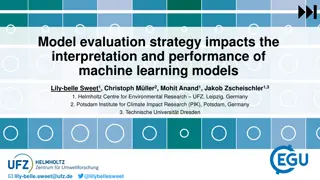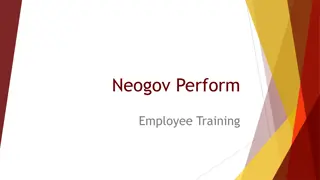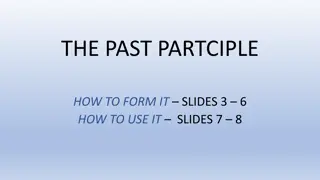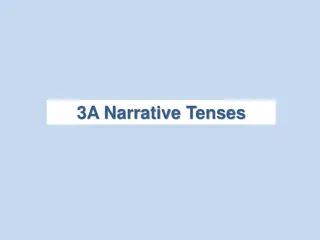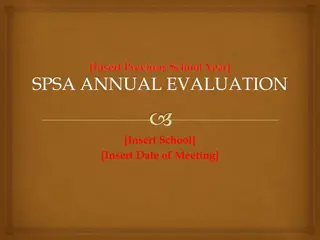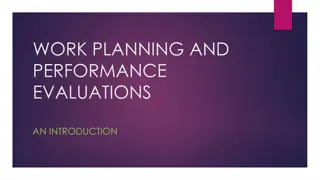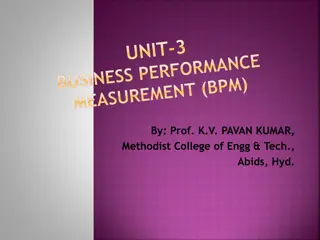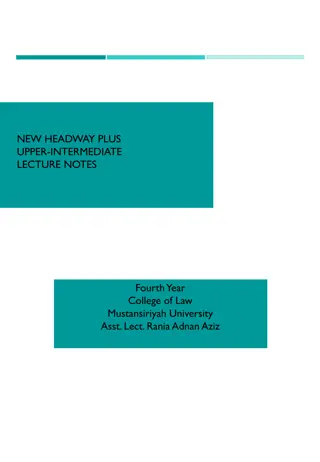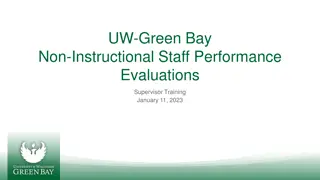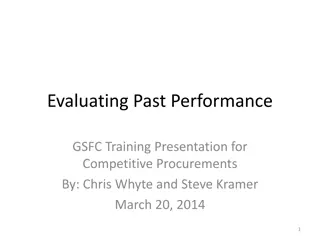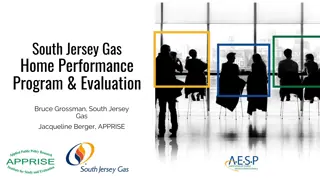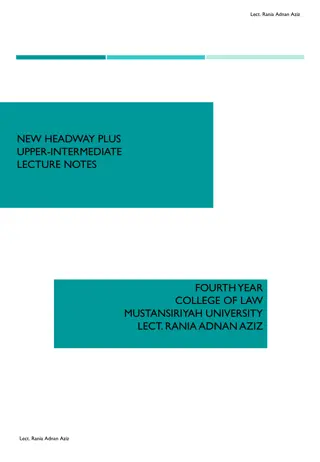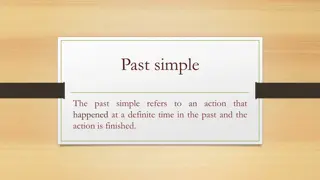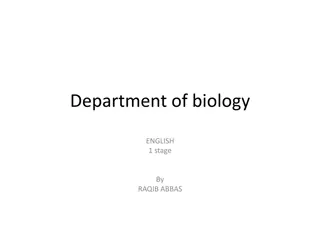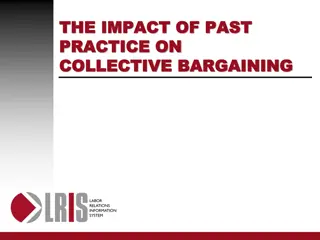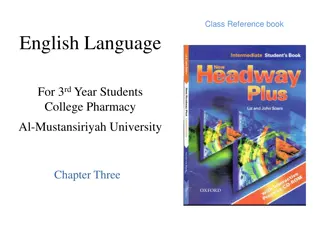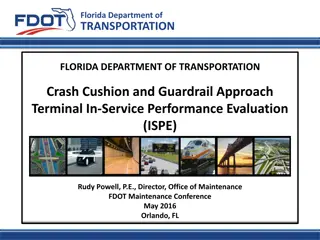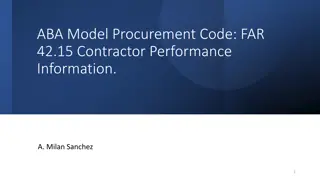Maqasid al-Shariah-Based Performance Evaluation Index for Islamic Social Finance Institutions
This study focuses on developing a performance evaluation index for Islamic social finance institutions (ISFIs) based on Maqasid al-Shariah to better measure their performance beyond just financial aspects. The aim is to analyze how far ISFIs have accomplished Maqasid during their operations through
1 views • 22 slides
Actions Emanating from the Evaluation of the Governance Reform
The evaluation of the governance reform within the WMO aimed to assess its alignment with strategic objectives, effectiveness in responding to societal needs, coordination efficiency, decision-making process, agility, and more. Evaluation criteria included relevance, design validity, effectiveness,
1 views • 13 slides
Learn Past Continuous Tense - Grade 6 English Lesson
This Grade 6 English lesson focuses on understanding and correctly using the past continuous tense. It covers the rules for forming the past continuous tense, examples of its usage, and an assessment to test comprehension. Students will practice talking about actions happening at specific times in t
4 views • 6 slides
Model evaluation strategy impacts the interpretation and performance of machine learning models
The evaluation strategy used for machine learning models significantly impacts their interpretation and performance. This study explores different evaluation methods and their implications for understanding climate-crop dynamics using explainable machine learning approaches. The strategy involves tr
6 views • 16 slides
Neogov Perform Employee Training Overview
Neogov Perform is a cloud-based software module that automates annual performance evaluations. The process includes manager input of employee goals, self-evaluation, manager rating, and HR sign-off. Accessing Perform through Neogov's SSO login, managers can view and complete evaluation tasks efficie
1 views • 20 slides
Universal Evaluation Framework: Simplifying Evaluation Processes
This session introduces the Universal Evaluation Framework (UEF) developed for evaluating QAA Scotland Enhancement Themes. Participants learn key evaluation questions, evidence capture, and the Theory of Change to enhance evaluation confidence. The QAA Scotland Evaluation Odyssey details historical
2 views • 14 slides
Mastering the Past Participle in English Verbs
Understand how to form and use the past participle in English verbs, both regular and irregular. Learn the rules for forming regular past participles, including when to double consonants and when to change 'y' to 'i'. Discover examples of irregular verbs and how their past participles are formed. Ex
0 views • 8 slides
Implementing Blind Evaluation Pilot in HORIZON EUROPE: Key Facts and Process
HORIZON EUROPE is conducting a pilot on Blind Evaluation in the 2023-2024 work program to address biases in the research and innovation evaluation process. The pilot aims to assess the feasibility of blind evaluations in ensuring fairness and mitigating potential biases towards well-known organizati
9 views • 9 slides
Understanding Past Tenses in Narratives
Exploring the use of past simple, past continuous, past perfect, and past perfect continuous tenses in narratives with examples and explanations. Learn how to convey different past events and their relationships in storytelling.
1 views • 4 slides
Exploring Developmental Evaluation for Better Decision-Making
Delve into the realm of developmental evaluation, focusing on its purpose, principles, and application in practice. Understand how developmental evaluation emphasizes real-time data collection for informed decision-making in complex systems. Learn about key principles such as developmental purpose,
0 views • 25 slides
Overview of Performance Management Systems and Competency Mapping
Performance Management Systems (PMS) play a crucial role in ensuring organizational objectives are met through individual contributions. This entails continuous improvement at all levels - individual, team, and organizational. Managing performance is vital for survival and growth in a competitive en
3 views • 45 slides
School Program Evaluation and Improvement Overview
This document reviews the Annual Evaluation of the School Plan for Student Achievement (SPSA) to assess the effectiveness of strategies implemented in the previous school year. The evaluation aims to determine the impact on the educational program and whether goals were met. Key questions focus on i
1 views • 22 slides
Enhancing Evaluation Capabilities in Mongolia for Agenda 2030
The Mongolian Evaluation Network in collaboration with UNDP is working to integrate the 2030 Agenda into national strategies and plans, establish institutional coordination mechanisms, align budgets, and enhance data monitoring systems. Key stakeholders including government agencies, NGOs, and inter
0 views • 9 slides
Work Planning and Performance Evaluations - An Overview
This introduction covers the importance of work planning and performance evaluations in achieving organizational goals. It outlines the stages of the evaluation process, including work planning, work progress review, formal performance evaluation, and performance evaluation interview. Guidance on us
2 views • 35 slides
Understanding Evaluation in Education
Evaluation in education is a comprehensive term that encompasses measurement, testing, and qualitative examination of student behavior. It involves both quantitative and qualitative descriptions, along with value judgments. Differentiating from mere measurement, evaluation provides a deeper analysis
0 views • 28 slides
Understanding Business Performance Measurement (BPM) and Essential Elements
Business Performance Measurement (BPM) refers to the processes used by organizations to assess their performance and achieve set goals. It involves employing tools, techniques, methodologies, and metrics to monitor and manage business performance. Performance measures help evaluate progress, goal ac
5 views • 57 slides
Sustainable Evaluation Systems Workshop Summary
Workshop on Sustainable Evaluation Systems by Stephen Porter at the NEC Conference focused on defining evaluation systems, addressing their failures, and emphasizing the importance of quality, use, and networks in achieving sustainability. Participants engaged in activities such as bingo card introd
0 views • 38 slides
Understanding the Present Perfect Tense in English Grammar
The lecture notes explore the Present Perfect tense, highlighting its connection between past actions and their relevance in the present. It compares the Past and Present Perfect tenses, discussing the nuanced differences and providing examples for clarity. The document covers the usage of the Prese
0 views • 8 slides
Impact and Evaluation Toolkit for Churches and Christian Charities
This toolkit aims to equip churches and Christian charities engaged in small-scale social action projects to think about impact, measure impact, choose data tools, reflect on evaluation data, and use it effectively. It covers principles of evaluation, setting objectives, selecting indicators, storyt
0 views • 34 slides
Understanding the Past Perfect Tense in English Grammar
The Past Perfect Tense is used to talk about actions completed before a certain point in the past, emphasizing the sequence of events. This tense follows the structure of "had + past participle" and is crucial for expressing events that happened earlier than others in a narrative. Knowing how to for
0 views • 27 slides
Evaluation Metrics for IEEE 802.11-14/0107 HEW Proposal
Evaluation metrics play a crucial role in assessing WLAN system performance and achieving the objectives of High Efficiency WLAN (HEW). This proposal by Yonggang Fang et al. from ZTE outlines the key evaluation metrics recommended for evaluating HEW performance, including area throughput, average th
0 views • 12 slides
Overview of Monitoring and Evaluation in the GEF
The Evaluation in the GEF and Training Module focuses on promoting accountability and learning within the Global Environment Facility (GEF) through monitoring and evaluation activities. The GEF Independent Evaluation Office plays a crucial role in assessing results, effectiveness, and performance of
0 views • 25 slides
UW-Green Bay Non-Instructional Staff Performance Evaluation Training Overview
This training outlines the upcoming changes in performance evaluation processes for academic and university staff at UW-Green Bay. It discusses the new 2023 performance review form, managing employee performance best practices, and the rationale behind the changes. The session also addresses the imp
0 views • 21 slides
Developing an Evaluation Work Plan for Effective Program Assessment
This presentation by Amy D. Andrade from San Jose State University focuses on developing an Evaluation Work Plan to identify responsibilities and timelines. It covers topics such as Evaluation Coaching Support, Webinar Outlines, Logic Model, Inputs-Outputs-Outcomes, Two Approaches to Evaluation, Pro
0 views • 29 slides
Understanding Simple Past Tense in English: Rules and Examples
The simple past tense is a fundamental form in Modern English used to describe past events. It involves regular verbs adding "-ed" and irregular verbs having different forms. The construction of the simple past helps distinguish it from other past tense forms like past perfect and past progressive.
0 views • 33 slides
Evaluating Past Performance for Competitive Procurements Training Overview
Understanding past performance evaluation in federal procurements is crucial for assessing contractors' abilities. This training presentation covers the relevant regulations, evaluation sources, getting started guidance, and considerations like recency. The ultimate goal is to reach a consensus Leve
0 views • 30 slides
South Jersey Gas Home Performance Program Evaluation Overview
Overview of South Jersey Gas's Home Performance Program presented at the AESP National Conference #AESP18. The program includes energy efficiency initiatives, evaluation findings, regulatory approach, goals, marketing strategies, and evaluation methods. Focus on increasing energy efficiency opportun
0 views • 16 slides
Understanding Narrative Tenses: Past Simple, Present Perfect, and Past Continuous
Explore the nuances of narrative tenses through detailed lecture notes by Lecturer Rania Adnan Aziz. Learn the differences between Past Simple and Present Perfect, grasp the usage of Past Continuous, and understand the significance of Past Perfect in expressing past actions and timelines. Dive into
0 views • 6 slides
Understanding the Past Perfect Tense in English Grammar
The past perfect tense expresses actions that occurred before another action in the past, referring to time up to a point in the past. It is often used in reported speech and formal writing to indicate completed actions before a specific event. The past perfect progressive tense emphasizes the durat
0 views • 15 slides
Understanding Verb Tenses: Present Perfect and Past Perfect Forms
Explore the usage of present perfect and past perfect verb forms to indicate relationships of time and cause. Present perfect verbs denote actions with undefined past timing but relevance to the present, while past perfect verbs describe events that occurred before another past event. Examples and e
0 views • 7 slides
Understanding the Past Simple Tense in English Grammar
The past simple tense refers to actions that occurred at a specific time in the past and are now completed. This tense follows a specific rule where the subject is combined with a verb (regular or irregular) and a complement. Adverbs like "yesterday," "ago," and "last" are commonly used with past si
0 views • 9 slides
Understanding Past Simple Tense in English Grammar
The past simple tense is used to describe completed actions or events that happened at a specific time in the past. Regular verbs form the past simple by adding "-ed", while irregular verbs have unique past tense forms. The structure for negative and question forms involves the auxiliary verb "did".
0 views • 6 slides
Evaluation Synthesis in Changing Contexts: Enhancing Knowledge for Development Effectiveness
Evaluation synthesis is crucial for promoting learning, reflection, and decision-making in development work. This process involves bringing together diverse knowledge sources to generate strategic insights and facilitate wider use of evaluation findings. The Independent Office of Evaluation of IFAD
0 views • 20 slides
Evaluation of FME Zero Emission Neighbourhoods in Smart Cities
The mid-term evaluation process of FME Zero Emission Neighbourhoods in Smart Cities involves self-evaluation, partner evaluation, and panel evaluation. The procedure includes scientific review, evaluation by scholars, and innovation assessment. Key documents like self-reports, progress reports, and
1 views • 20 slides
Understanding the Impact of Past Practices on Collective Bargaining
Exploring the significance of past practices in interpreting, supplementing, and potentially contradicting contract language within the context of collective bargaining. Covering topics such as the definition of past practices, the duty to bargain, waivers of protest rights, and remedies for unlawfu
0 views • 35 slides
Overview of Regular Evaluation 2017 Findings in Estonia
In the Regular Evaluation 2017, efforts were made to maximize the benefits of evaluation outcomes for various stakeholders in Estonia such as the state, society, and institutions. The evaluation focused on a range of actions including preparing legislation, finding experts, creating self-report form
0 views • 6 slides
Understanding Past Tenses in English for 3rd Year College Pharmacy Students
Dive into the intricacies of past tenses in English as you explore the nuances between past simple, past continuous, past perfect, and more. Test your grammar skills while learning to express events that occurred in the past, with a focus on practical application for students at Al-Mustansiriyah Uni
0 views • 25 slides
Comprehensive Guide to Training Evaluation Methods
This detailed guide covers the aim of evaluation, evaluation methods, techniques of evaluation, types of evaluation (formative, process, outcome, impact), and the significance of formative and process evaluation in assessing training effectiveness. Learn about the key principles and practices involv
0 views • 45 slides
In-Service Performance Evaluation of Crash Cushions and Guardrail Approach Terminals
In-Service Performance Evaluations (ISPE) assess the safety performance of crash cushions and guardrail approach terminals installed on roads. This evaluation involves data gathering and analysis in collaboration with various offices to ensure road safety. The FHWA recommendation prompted the initia
0 views • 21 slides
Enhancing Federal Procurement Standards Through Past Performance Documentation
Proposal to add a FAR Subpart 42.15-like section to the MPC for recording Contractor Performance Information, in alignment with OMB guidance in 2 CFR Part 200. The history and importance of past performance evaluation in federal grants and agreements are highlighted, emphasizing the need for a struc
0 views • 13 slides



